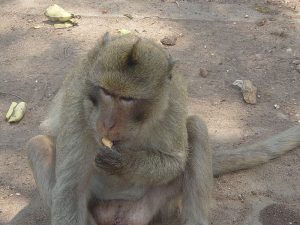A federal investigator who visited the Tulane National Primate Research Center (TNPRC) in late January as part of the response to the November 2014 Burkholderia pseudomallei infections of two macaques who may have been exposed to the bacterium.

Image/Rlevse
One person in the investigation team fell ill with nonspecific symptoms. An antibody test was performed and results on February 7, 2015 indicated possible current or prior exposure to the bacteria. The individual has a history of travel that could have resulted in exposure to this organism, and is doing well at present.
The CDC and USDA initiated a joint investigation of TNPRC in January 2015 after the animals were infected with B.pseudomallei (which can cause melioidosis). One animal was euthanized on November 26 and the remaining animal has recovered. No additional cases have been recognized.
The Department of Health and Human Services’ Centers for Disease Control and Prevention, along with the U. S. Department of Agriculture (USDA) and the Environmental Protection Agency (EPA), continues to work with Tulane University and state and local officials to identify, isolate, mitigate and prevent further transmission of BURKHOLDERIA PSEUDOMALLEI within the compound. Environmental testing – including Air, water, soil sampling – will guide remediation activities. Once samples are collected, it will take 1-2 weeks to obtain results.
The Centers for Disease Control and Prevention have told TNPRC to stop research on some dangerous “agents” while it investigates the center’s procedures.
Governor Bobby Jindal said, “Earlier today, I spoke with President Brister and Superintendent Folse to pledge the state’s support. State agencies are on the ground and embedded in St. Tammany’s emergency operations center, and I have charged our agencies to lean forward and support their federal partners.”
Melioidosis (also known as Whitmore disease and Nightcliff gardener’s disease) is caused by the bacterium, Burkholderia pseudomallei. The disease though somewhat rare has been seen in areas of Southeast Asia and Northern Australia, particularly after heavy rains. In Thailand it is considered a disease of rice farmers.
The organism is saprophytically found in soil and water. People usually get infected by contact with contaminated soil or water through skin wounds, inhalation or rarely through ingestion of contaminated water.
Person to person transmission can occur through contact with blood and body fluids of an infected person.
Depending on how heavy the infection incubation can range from hours to weeks. Infection may show nosymptoms but it can quickly progress to disseminated disease involving skin and a variety of organs.
Pneumonia from B. pseudomallei can be seen either in acute or chronic disease. Chronic pulmonary meloidosis may present itself years after exposure and can mimic tuberculosis.
Fatality rates of melioidosis can reach up to 75 percent even with appropriate antibiotic treatment. Fatalities are particularly greater in those with underlying conditions like diabetes mellitus or renal disease.
People at higher risk of contracting this disease are those with jobs or hobbies that increase their exposure to contaminated soil and water like military, construction, farmers, eco-tourists and other adventure travelers.
Prevention is based on avoiding exposure of cuts and other trauma with soil and water in endemic areas. This is especially important if the person has an underlying disease. The use of boots and gloves are recommended for people whose work involves contact with soil and water, like farmers.


One thought on “Burkholderia pseudomallei at the Tulane National Primate Research Center”